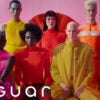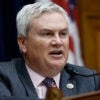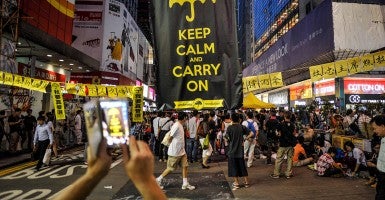Cars began transiting through Hong Kong’s Admiralty district overnight for the first time in 75 days, as police finally brought an end to that city’s cry for democracy. But Hong Kong’s communist overlords in Beijing will not enjoy their victory forever.
There were still a few hundred “randomly walking” through the streets of the Asian financial hub late Thursday and shouting the occasional pro-freedom slogan, according to witnesses reached on the scene. Their intent was to annoy the police one last time while still avoiding arrest.
In an unnecessary act of truculence, among those the police arrested were the septuagenarian father of the Hong Kong democracy movement, Martin Lee, and the owner of Hong Kong’s last remaining independent paper Apple Daily, Jimmy Lai – both friends of The Heritage Foundation, plus legislators and cultural figures. A source said that they were “not cooperating with the police” and were still in prison at 11 p.m. Thursday night.
The demonstrations began in earnest in September and covered different parts of the city. The posh Admiralty district downtown was occupied early and became the fulcrum of the protests for the right to elect Hong Kong’s leader, the chief executive.
The People’s Republic of China, which has ruled Hong Kong since Britain handed sovereignty of its former colony in 1997, insists that Hong Kong people can only choose from among a handful of candidates chosen by a pro-Beijing committee.
As expected, the Hong Kong demonstrators did not gain democracy from a government in Beijing that in 1989 preferred to shoot thousands of its own people to giving in to their demands for the same thing. It shouldn’t take longer than a few minutes of reflection to realize that communism and freedom are mutually exclusive.
But the People’s Republic of China and its selected government in Hong Kong have been put on notice that the stereotype that the people of Hong Kong only care about making money isn’t true. Though support for the demonstrations waned over time as traffic snarls grew worse in the crowded city, there is broad support for the principle of universal suffrage and the greatest degree of autonomy.
The student-led demonstrators have also instructed an entire generation on the principle of civil disobedience and how to hold massive demonstrations peacefully and without destruction to property.
The demonstrators also opened many eyes overseas about the true nature of the People’s Republic of China’s government, which often gets a pass because over the past few decades it has introduced economic reforms and some elements of capitalism. The People’s Republic of China had promised Britain and the people of Hong Kong a “high degree of autonomy” and universal suffrage.
“Hong Kong is a test of China’s willingness to comply with its international commitments,” Sen. Sherrod Brown, D-Ohio, said on Nov. 20 at a hearing of the Congressional-Executive Commission on China. “If China can so easily renege on its promises to Hong Kong, then how can we expect China to hold up its end of the bargain on issues like World Trade Organization compliance or future trade agreements?”
A bipartisan and bicameral group of congressmen have introduced legislation called the “Hong Kong Human Rights and Democracy Act.” The bill amends the U.S. law on Hong Kong, the 1992 Hong Kong Policy Act, by reinstituting the requirement that Congress report to the president on Hong Kong’s democratization on an annual basis—a clause that lapsed in 2007. It also requires the president to certify that Hong Kong has achieved sufficient autonomy before the U.S. undertakes any law or treaty that treats Hong Kong differently from the rest of China.
So if the autocrats ruling the People’s Republic of China think that bullying a bunch of students is a feather in their cap they may be mistaken.






























